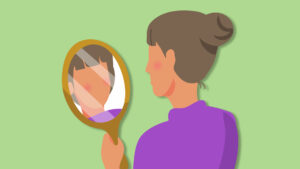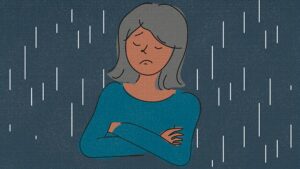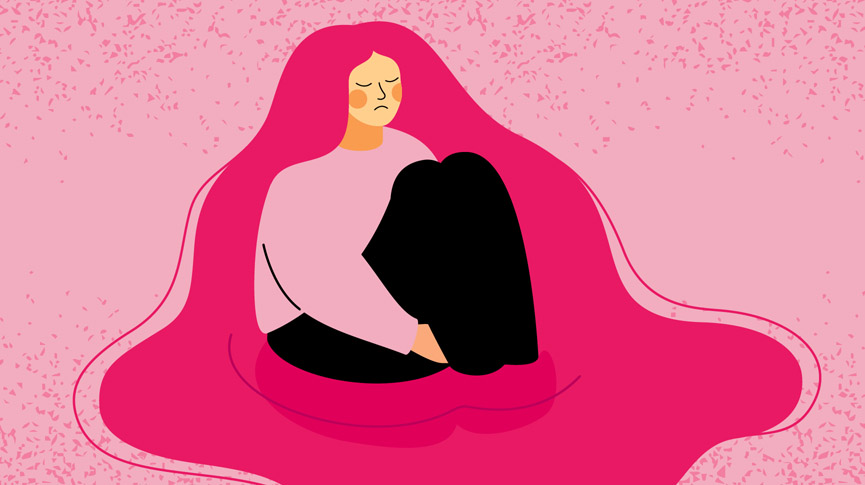Depression is a common problem for women during menopause. It can be caused by the hormonal changes that occur during this time, by stress, or by other factors. If you are experiencing depression during menopause, it is important to get help. There are treatments available that can help you feel better. In this blog post, we will discuss the causes of depression during menopause and the treatments that are available. We will also provide tips for coping with depression during this time.
Contents
Defining Depression

Depression is more than just feeling sad. It is a real medical condition that can cause physical, emotional, and social problems. Depression during menopause can make it hard to enjoy activities that you used to enjoy. It can also make it difficult to work, take care of your family, or even take care of yourself.
It is important to note that depression is not the same thing as “the blues.” The blues are a normal part of life and usually go away within a few days. Depression is more than just feeling down for a day or two. It is a persistent feeling of sadness, hopelessness, or worthlessness that can last for weeks or even months.
Defining Menopause
Menopause is the time in a woman’s life when her menstrual periods stop. It is a normal part of aging and usually occurs between the ages of 45 and 55. Menopause can cause a variety of symptoms, including hot flashes, night sweats, vaginal dryness, and mood swings. Menopause can also cause changes in a woman’s hormone levels. These changes can lead to problems such as sleep problems, weight gain, and depression.
It is important to note that menopause is not a disease. Menopause is a natural process that happens to all women as they age. It is not something that can be cured. However, there are treatments available that can help relieve the symptoms of menopause.
Depression And Menopause

Depression is common in women during menopause. Although there is no established link between menopause and depression, there are a few reasons why the two may be related.
- First, the hormonal changes that occur during menopause can lead to mood swings and irritability. Low levels of serotonin are associated with depression. These changes can also cause physical symptoms such as hot flashes and night sweats, which can further contribute to feelings of depression.
- Second, the stress of dealing with the symptoms of menopause can also contribute to depression. In addition, some women may feel like they are losing their femininity or sexuality as they transition into menopause. This can lead to feelings of sadness, loneliness, or even worthlessness.
- Moreover, it has also been estimated that up to 20% of women experience depression during perimenopause, which is the time leading up to menopause.
The link between these two conditions is still under research, but it is clear that depression is a common problem for women during menopause.
Signs And Symptoms

Symptoms of depression and menopause can often overlap. It can become extremely difficult to distinguish between the two conditions and their signs. However, some of the most obvious tell-all signs for these conditions include:
- Persistent sad, anxious, or “empty” mood
- Loss of interest or pleasure in activities that were once enjoyable
- Changes in appetite, weight loss or gain
- Severe mood swings
- Fluctuations in libido
- Sleep problems (insomnia or sleeping too much)
- Loss of energy or increased fatigue
- Increase in purposeless physical activity (e.g., pacing, hand wringing, restlessness)
- Feelings of worthlessness, hopelessness, or guilt
- Difficulty thinking, concentrating, and making decisions
- Thoughts of death or suicide
- Physiological difficulties such as hot flashes, aches, pains, and disturbances in the body.
It is important to note that not all women experience all of these symptoms. Each individual will likely experience a unique set of symptoms.
Causes
There is no one single cause for depression during menopause. Rather, it is likely caused by a combination of factors. These may include:
- Hormonal changes: The hormonal changes that occur during menopause can play a role in the development of depression. In addition, the use of hormone replacement therapy (HRT) to treat menopausal symptoms can also lead to depression in some women.
- Stress: The stress of dealing with the physical and emotional changes that occur during menopause can contribute to depression. In addition, many women find themselves dealing with additional stressors during this time, such as work, family, and financial problems.
- Genetic factors: Depression can run in families. If you have a family history of depression, you may be more likely to experience it during menopause.
- Brain changes: Research has shown that there are differences in the way the brains of women with depression look compared to those without depression. These changes may be caused by hormonal changes or other factors.
- Other health problems: Depression during menopause may be caused by other health problems, such as thyroid problems or heart disease. These conditions can cause changes in hormone levels, which can lead to depression.
- Poor self-care: Women who smoke, don’t exercise, and eat an unhealthy diet are more likely to experience depression during menopause. This happens because these behaviors can lead to hormonal imbalances and other health problems.
A woman may be prone to menopause depression due to one or more of the above factors.
Effects On Life
Depression during menopause can have a significant impact on a woman’s life. It can cause problems in various domains of life such as:
- Work: Depression can make it difficult to concentrate at work, which can lead to problems with job performance. In addition, depression may increase the risk of absenteeism and job loss.
- Family and social life: Depression during menopause can strain relationships with family and friends. It can also make it difficult to participate in social activities or hobbies that you once enjoyed.
- Physical health: Depression can lead to increased stress, which can worsen various physical health conditions. In addition, depression may cause you to neglect your physical health, which can lead to weight gain, poor nutrition, and other problems.
All of these effects can lead to the depletion of important resources such as time, money, and energy. As a result, depression during menopause can have a significant impact on your quality of life.
Diagnosis
Depression during menopause is often underdiagnosed and undertreated. This is because many women do not seek help for their symptoms. In addition, doctors may not think to ask about menopausal depression or may misattribute the symptoms to other conditions such as anxiety or stress.
For an official diagnosis, you may want to consult either a gynecologist or psychologist.
A gynecologist can assess and diagnose with the help of interventions such as:
- Asking about your medical history
- Doing physical examinations such as a pelvic exam
- Ordering blood tests
A psychologist can assess and diagnose depression with the help of interventions such as:
- Asking about your symptoms
- Administering psychological tests
- Observing your behavior and mood
- Conducting a mental health assessment
After successful administration and diagnostic reporting, they may start with developing a treatment plan.
Treatment Options

If you think you may be suffering from depression during menopause, it is important to seek treatment. There are many effective treatments for depression, including:
Medication
Medicines for managing depression as well as menopause are the most common form of treatment. Various types of antidepressant medications are available, and the best type for you will depend on your individual symptoms. Some of the most common examples include:
- Hormone therapy: This treatment involves taking hormones to replace the ones that are lost during menopause. Hormone therapy can be taken in pill form or through skin patches, gels, or creams. This also includes vaginal estrogen, which comes in the form of a cream, tablet, or ring.
- Selective serotonin reuptake inhibitors (SSRIs): These are the most commonly prescribed type of antidepressant. They work by increasing levels of serotonin in the brain. Examples include fluoxetine (Prozac), sertraline (Zoloft), and paroxetine (Paxil).
- Serotonin-norepinephrine reuptake inhibitors (SNRIs): These drugs work by increasing levels of both serotonin and norepinephrine in the brain. Examples include duloxetine (Cymbalta) and venlafaxine (Effexor).
- Norepinephrine-dopamine reuptake inhibitors: These drugs increase levels of norepinephrine and dopamine in the brain. Examples include bupropion (Wellbutrin) and desvenlafaxine (Pristiq).
- Tricyclic antidepressants: These drugs work by increasing levels of norepinephrine and serotonin in the brain. They are not as commonly prescribed as other types of antidepressants because they can cause more side effects. Examples include amitriptyline (Elavil) and nortriptyline (Pamelor).
- Monoamine oxidase inhibitors: These drugs work by inhibiting the action of monoamine oxidase, an enzyme that breaks down norepinephrine, dopamine, and serotonin in the brain. Monoamine oxidase inhibitors are not as commonly prescribed as other types of antidepressants because they can cause more side effects. Examples include phenelzine (Nardil) and tranylcypromine (Parnate).
If you are deciding to undergo medication for treatment, it is extremely important to keep in contact with your doctor. They will provide you with a legal and valid prescription you may require to access these drugs. They will also help you to manage the side effects that come along with these medicines.
Psychotherapy
Psychotherapy, also known as talk therapy, is another effective treatment for depression. It can help you identify and change negative thinking patterns and behaviors that contribute to your depression. Various types of psychotherapy are available, but cognitive-behavioral therapy (CBT) is the most commonly used type of therapy for depression. CBT typically involves meeting with a therapist once a week for several weeks or months.
Some other types and techniques of therapy can also include:
- Interpersonal therapy: This type of therapy focus es on your relationships and how they may be affecting your depression.
- Psychodynamic therapy: This type of therapy focuses on exploring the unconscious mind and how it may be impacting your current mental state.
- Solution-focused therapy: This type of therapy focuses on finding solutions to current problems that may be contributing to your depression.
- Expressive therapy: This type of therapy uses different expressive modalities, such as art, music, or writing, to help you process and express your emotions.
Your respective therapist will work with you to come up with a treatment plan in accordance with the most suitable type of therapy for you.
Lifestyle changes
Making lifestyle changes can also help reduce the symptoms of menopause depression. Some lifestyle changes that may be helpful include:
- Getting regular exercise: Exercise can help improve your mood and alleviate other menopause symptoms.
- Eating a healthy diet: Eating a diet that is rich in fruits, vegetables, and whole grains can help reduce the symptoms of depression.
- Getting enough sleep: Getting enough sleep is important for managing stress and maintaining a healthy lifestyle.
- Reducing stress: Reducing stress can help improve your mood and overall well-being.
- Quit smoking: Smoking can worsen the symptoms of depression. If you smoke, quitting can help reduce your risk of developing depression.
- Alcohol abuse: Drinking too much alcohol can increase the risk of developing depression. If you drink alcohol, it is important to do so in moderation.
These are just some of the treatments that are available for depression during menopause. If you think you may be suffering from depression, it is important to talk to your doctor. Treatment can help improve your mood and quality of life.
Conclusion
Depression during menopause is a real and serious condition that can impact your quality of life. If you think you may be suffering from depression, it is important to seek treatment. There are many effective treatments for depression. Talk to your doctor about the best treatment options for you. With treatment, you can improve your mood and enjoy your life again.
For more information, please contact MantraCare. Depression is a mental illness characterized by persistent feelings of sadness, hopelessness, and loss of interest in daily activities. If you have any queries regarding Online Depression Counseling experienced therapists at MantraCare can help: Book a trial Depression Therapy session


